Best Paraphrasing Tool | Free & Premium Tools Compared
Paraphrasing means rewording something – expressing the same idea in different words. Paraphrasing tools (or paraphrasers) are AI-powered online tools that can automatically rewrite your text for you. Students often use them to improve their writing and provide inspiration – making their text more formal, more fluent, or more concise.
But which online paraphrasers are really reliable at producing correct and readable English? To find out, we tested seven of the most popular free tools – and their premium versions when available.
We wrote three short sample texts to test their ability to improve text that was long-winded, grammatically incorrect, or disjointed. We ran these texts through all the different tools and assessed the fluency and accuracy of the output. We also took the user-friendliness of the tools into consideration.
The results show that the premium versions of Wordtune and QuillBot are the best tools out there, each excelling in different ways. If you’re looking for a free tool, Paraphrase Tool and QuillBot are the strongest options.
| Paraphrasing tool | Score |
|---|---|
| 1. Wordtune (Premium) | 4.0 |
| 2. QuillBot (Premium) | 4.0 |
| 3. Paraphrase Tool (Free) | 3.5 |
| 4. QuillBot (Free) | 3.5 |
| 5. Paraphrase Tool (Premium) | 3.0 |
| 6. Wordtune (Free) | 3.0 |
| 7. Rephrase (Free) | 2.5 |
| 8. Paraphraser.io (Free) | 2.0 |
| 9. Rephrase (Premium) | 2.0 |
| 10. Paraphraser.io (Premium) | 1.5 |
| 11. SpinBot (Free) | 0.5 |
| 12. Pre Post SEO (Free) | 0.5 |
| 13. Pre Post SEO (Premium) | 0.5 |
You can read about our methodology below.
Table of contents
- 1. Wordtune (Premium)
- 2. QuillBot (Premium)
- 3. Paraphrase Tool (Free)
- 4. QuillBot (Free)
- 5. Paraphrase Tool (Premium)
- 6. Wordtune (Free)
- 7. Rephrase (Free)
- 8. Paraphraser.io (Free)
- 9. Rephrase (Premium)
- 10. Paraphraser.io (Premium)
- 11. SpinBot
- 12. Pre Post SEO (Free)
- 13. Pre Post SEO (Premium)
- Honorable mention: Grammarly
- Research methodology
- Frequently asked questions
1. Wordtune (Premium)
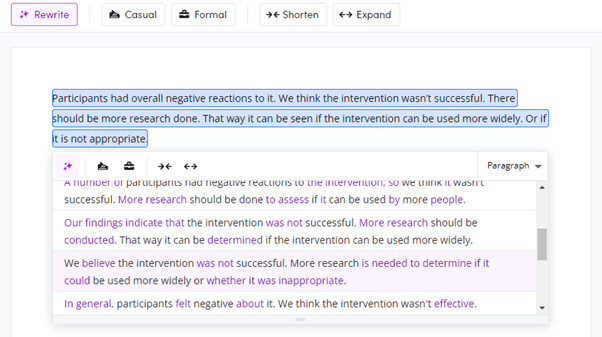
- Paragraph rewrite mode is unique and helpful
- Does well with both disjointed and ungrammatical text
- 10 options for each paraphrase
- Clean look
- $24.99 per month
- ‘Shorten’ mode not great
- Interface can be slightly buggy
Wordtune’s premium version was overall the most useful tool we tested. It provided a selection of 10 rewrites for each text. Not all of these were great, but there were generally a few good options in each case.
Where Wordtune stood out was in its whole-paragraph paraphrasing mode, which was able to combine sentences in an intelligent way, thus improving our disjointed and grammatically incorrect texts significantly. Unfortunately, the ‘Shorten’ mode did little to actually shorten long-winded text, mostly functioning quite similarly to the standard rewrite mode.
We found the look of the site fairly clean and appreciated that it offers 10 different suggestions for each sentence. But we did find the interface somewhat awkward at times, and it was occasionally unable to generate suggestions in certain modes or would only generate one suggestion, suggesting some imperfections in the technology.
2. QuillBot (Premium)
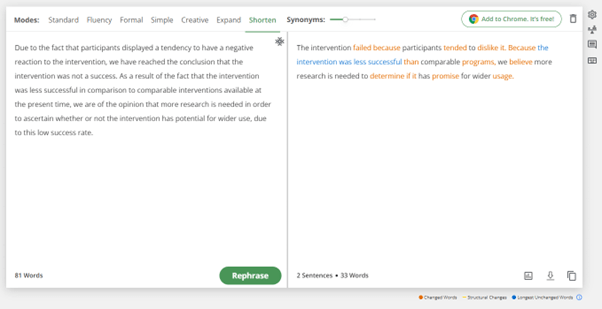
- Great for shortening long-winded text
- Reliable, accurate, grammatically correct output
- Interactive synonym finder
- Seven modes with noticeably different results
- $19.95 per month (3-day money-back guarantee)
- No paragraph rewrite mode
- Does little to improve disjointed text
The premium version of QuillBot was one of the strongest paraphrasers we tested. Its ‘Shorten’ mode was the best option for making long-winded text more concise. Unlike all other tools, it could consistently distinguish between unnecessary verbiage and essential details, often reducing the text’s length by more than 50% without compromising meaning.
With the grammatically incorrect text, QuillBot was quite consistent in its ability to remove glaring grammatical errors. But with this and the disjointed text, its ability to resolve sentence fragments was limited, since it seems to lack the ability to combine sentences – it only looks at each sentence individually. This problem was shared by most of the other tools we tested.
QuillBot’s interface is simple and usable, allowing you to choose from seven paraphrasing modes and manually adjust the number of synonyms. Paraphrasing is quick, and changes are clearly highlighted. You can also click on individual words to see more synonyms, with detailed information about how each should be used, making it flexible and informative.
Try Quillbot now
3. Paraphrase Tool (Free)
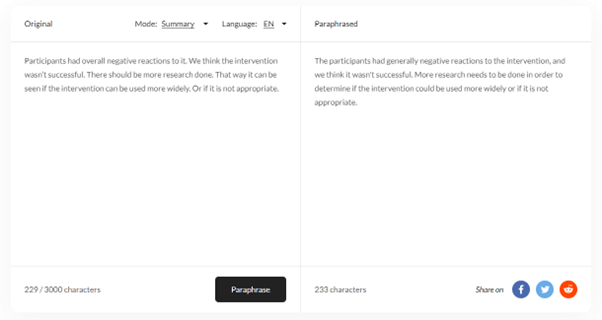
- ‘Summary’ mode is very good
- Handles all kinds of texts well (in ‘Summary’ mode)
- Free
- Other modes are very inaccurately labeled
- Some modes add irrelevant content
- Changes not marked in the text
Paraphrase Tool offered a large selection of different modes to paraphrase our text, some of them very useful. The most useful mode by far (for all of our texts) was ‘Summary’, which did a decent job of shortening the long-winded text and was able to combine sentences in the disjointed and grammatically confused texts, creating a much smoother read.
We found that other modes were not very accurately labeled: The ‘Shorten’ mode often produced a longer text than ‘Standard’ when the long-winded text was used. ‘Grammar’ mode appeared to just produce very long-winded and repetitive text, while ‘Smooth’ mode added a lot of text that was not based on anything in the original.
We appreciated the clean, minimalistic design of the site, but we did find it unhelpful that the changes made are not marked in any way in the output text. You’re also required to buy a subscription after a certain number of inputs, which isn’t clear when you start. In general, this is a strong paraphraser in ‘Summary’ mode but a very unreliable one in other modes.
4. QuillBot (Free)
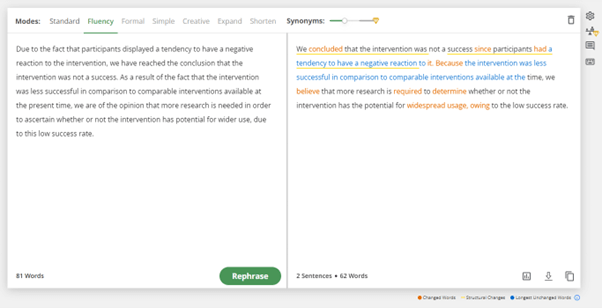
- Reliable, accurate, grammatically correct output
- Interactive synonym finder
- Free, quick, and easy to use
- No ‘Shorten’ mode in the free version
- No paragraph rewrite mode
- Does little to improve disjointed text
We found QuillBot’s free version almost as reliable as the premium option. Its changes were generally logical and fluent, staying true to the meaning of the original text while improving flow. And, like the premium version, it resolved grammatical errors well.
That said, its ability to cut down long-winded text was restricted, since the ‘Shorten’ mode is a premium feature. The two free modes, ‘Standard’ and ‘Fluency’, performed well for other purposes but did little to deal with long-windedness.
The other main differences are a word limit of 125 words per paraphrase and the fact that the highest setting for synonyms can’t be selected. Besides those changes, we found the interface just as usable in the free version as in the premium one.
Try Quillbot now
5. Paraphrase Tool (Premium)
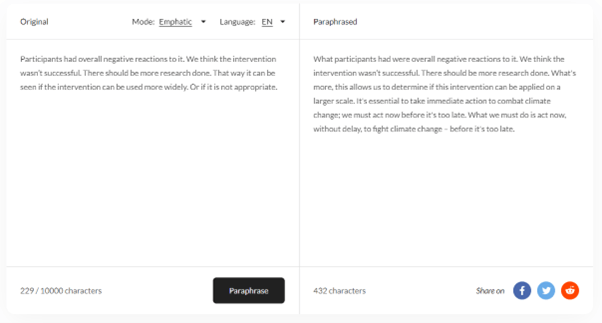
- ‘Summary’ mode is very good (but also available for free)
- Handles all kinds of texts well (in ‘Summary’ mode)
- No limit on inputs
- $7.99 per month (3-day free trial)
- Extra modes are not worth the cost, often ridiculous
- Changes not marked in the text
Paraphrase Tool’s premium version allows you unlimited paraphrases and unlocks 11 additional modes: ‘Academic’, ‘Confident’, ‘Simple’, ‘Smart’, ‘Clear’, ‘Thoughtful’, ‘Elaborate’, ‘Creative’, ‘Formal’, ‘Cohesive’, and ‘Emphatic’.
However, we found that these modes weren’t very useful or very accurately labeled. The ‘Summary’ mode, already available in the free version, remained the best choice for all of our texts. Other modes like ‘Emphatic’ inserted a lot of irrelevant text that had nothing to do with the original, generally making the text much longer and largely incoherent.
Because of this, the only real reason to pay for this tool is to remove the limit on inputs. But if you’re willing to pay, there are better options available. As the only part we can give a solid recommendation to, ‘Summary’ mode, is available for free, we don’t recommend paying.
6. Wordtune (Free)
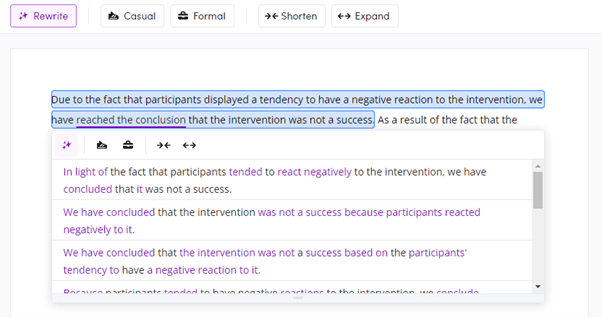
- 10 options for each paraphrase
- Clean look
- Free
- No paragraph rewrite mode
- ‘Shorten’ mode not great
- Interface can be slightly buggy
Wordtune’s free version lacks the option to paraphrase whole paragraphs, the feature that really stood out to us, so it doesn’t score as well as the premium version.
Without this feature, Wordtune did perform decently at making sense of the grammatically incorrect text, although it didn’t make it all that fluent. But like other tools that work on a sentence-by-sentence basis, it did a poor job of improving disjointed text. The ‘Shorten’ mode performed similarly to the premium version – not terribly, but not all that well.
We found it unfortunate that it limits users to 10 sentence rewrites per day in the free version and that rewrites can only be done on one sentence at a time. As with the premium version, we did like the overall look of the site. But if you’re looking for a free tool, QuillBot or Paraphrase Tool are better options.
7. Rephrase (Free)
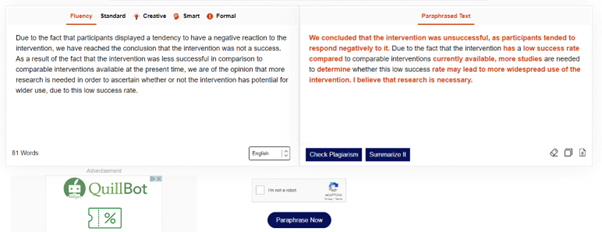
- Paraphrases are reasonably fluent
- Free
- Some changes distort meaning
- Full of adverts
- Slow and inconvenient to use
Rephrase did a moderately good job paraphrasing our texts. Its changes were generally more advanced than simply swapping out some words for synonyms, and they tended to mostly retain the original meaning (although with some differences such as changing ‘we’ to ‘I’).
It tended to resolve obvious grammatical problems effectively, although it couldn’t make the text completely smooth. It performed similarly to other tools with disjointed text, failing to combine sentences. It managed to cut down the long-winded text more than most and divide one sentence into two to improve readability, but some of its changes distorted the meaning.
In terms of usability, we found that the paraphrase sometimes loaded quite slowly, and the requirement to complete a captcha for repeated inputs was annoying. The site was also full of flashy adverts that were quite distracting and seemed to slow down the page.
8. Paraphraser.io (Free)
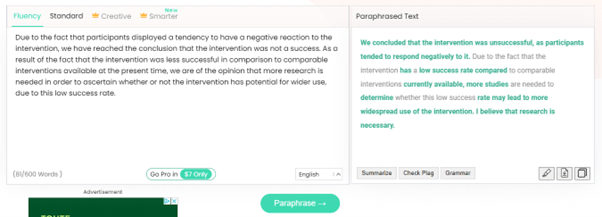
- Ensures basic grammatical correctness
- Free
- Quite basic rewrites
- Some highly inaccurate synonyms and bugs with output
- Very slow and buggy
Paraphraser.io’s rewrites were fairly basic. While it made some small changes to sentence structure, it mainly just swapped individual words out for synonyms, which were often highly inaccurate (e.g., changing ‘could’ to ‘bottle’). It could not deal with long-winded text well, since it lacked a ‘Shorten’ mode and tended to make the text even longer.
Its changes to the grammatically muddled text did usually ensure basic correctness, but not much fluency. Like the other tools, it was unable to do much to improve the flow of the disjointed text, since it wouldn’t combine sentences or add transition words. Occasionally, we saw errors like the insertion of sentence fragments without initial capitalisation.
In terms of usability, we found it unfortunate that the paraphrased text loaded extremely slowly (and sometimes just failed to load). We appreciated the ability to click on individual words to see synonyms, but as noted, a lot of these synonyms were just wrong. Overall, the interface was poor.
9. Rephrase (Premium)
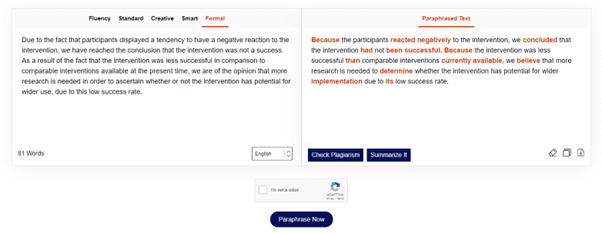
- Paraphrases are reasonably fluent
- $20 per month
- New modes add little
- Still full of adverts
- Still slow and inconvenient to use
The premium version of Rephrase adds three extra modes, ‘Creative’, ‘Smart’, and ‘Formal’. We noticed little difference between these modes and the free ones, and we don’t see them as worth paying for.
In terms of usability, we found it annoying that you’re still required to complete a captcha for each paraphrase, even after paying for the tool, and that the same flashy adverts still appear in the premium version. You get remarkably little for your money with the premium version of Rephrase.
10. Paraphraser.io (Premium)
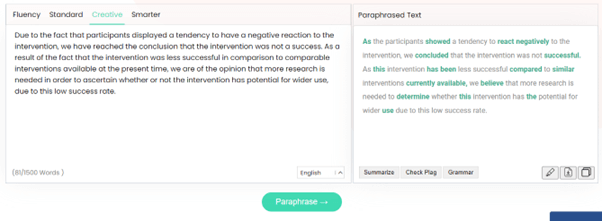
- Ensures basic grammatical correctness
- $20 per month
- Doesn’t actually remove adverts
- Very slow, buggy, and confusing interface
- No real advantages over free version
This tool’s premium version did not really add anything of value. The main selling point, the ‘Creative’ and ‘Smarter’ modes, performed very similarly to the free ‘Fluency’ mode, with no real advantages. The slow loading times were also no better in the premium version.
Other pros included a word limit increase to 1,500 words – not very helpful when the tool only paraphrases on a sentence-by-sentence basis anyway. The premium version is also supposed to remove adverts, but in practice we still saw adverts when using this version, so it’s not clear what is meant by this.
We don’t find this tool a very good option to begin with, and we certainly don’t find the premium version to be worth the cost.
11. SpinBot
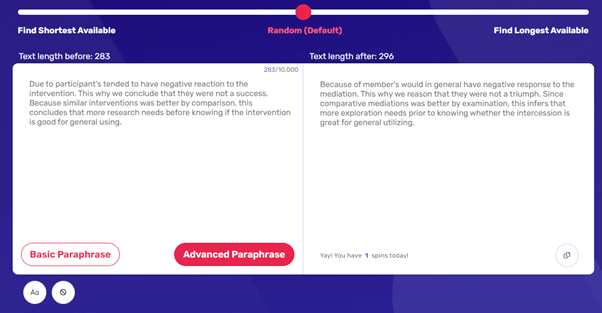
- Interface looks quite nice
- Free
- Doesn’t really paraphrase, just swaps words for synonyms
- Creates a lot of inaccuracies
- Doesn’t correct grammatical errors
- Doesn’t highlight changes
- ‘Advanced Paraphrase’ just redirects to QuillBot
We found SpinBot’s functionality to be extremely basic and produce a lot of errors. It did not do any real paraphrasing (changing the sentence structure) but simply swapped out a few words for synonyms, often highly inappropriate ones.
Because of this very basic approach, it failed to correct any of the grammatical errors in grammatically incorrect text. It also could not do anything useful for either the long-winded or the disjointed text, since it made no changes to structure whatsoever.
In terms of interface, the site has a nice enough look, but it doesn’t highlight the changes it has made in any way. Its ‘Advanced Paraphrase’ button just redirects to QuillBot. Basic paraphrasing is fairly quick, but – as mentioned above – not very good.
Try SpinBot’s paraphrasing tool
12. Pre Post SEO (Free)
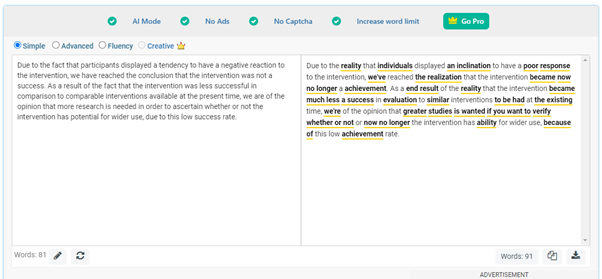
- Free
- Very basic paraphrasing
- Creates lots of grammatical errors
- Poorly designed interface
- Many features buggy or broken
- Slow to use
Pre Post SEO offered a few modes for paraphrasing: ‘Simple’, which just swaps out a few words for (usually inaccurate) synonyms, producing very poor text; ‘Advanced’, which makes slightly more extensive changes but produces a lot of errors; or ‘Fluency’, which does the same with fewer (but still some) errors.
None of these modes were very effective at improving any of our three texts. ‘Fluency’ mode was at least able to resolve some grammatical errors, but its changes tended to make all of the texts less, not more, readable.
The interface of the site was very poor. Besides inserting errors into your text, the page is full of flashy adverts and often freezes, forcing you to refresh the page. It’s necessary to complete a captcha for each input. Changes are highlighted in the text, and you’re supposed to be able to click on them for alternative synonyms, but this feature often breaks too.
Try Pre Post SEO’s paraphrasing tool
13. Pre Post SEO (Premium)
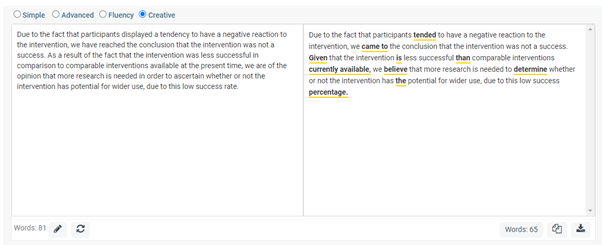
- $19 per month
- No worthwhile improvements over free version
- Creates lots of errors
- Poor interface
- Many features buggy or broken
- Slow
The premium version of Pre Post SEO claims to feature a higher word limit of 2,500 words, but we found that we could already input more words than that in the free version. Testing suggests that different word limits apply to different modes, but this is not clearly explained, making it confusing.
The other main points are the removal of adverts and captchas and the addition of a ‘Creative’ paraphrasing mode. We found that this mode produced very similar results to ‘Fluency’ mode and certainly wasn’t a feature worth paying $19 a month for. We don’t recommend paying for this tool.
Try Pre Post SEO’s paraphrasing tool
Honorable mention: Grammarly
Despite coming up frequently in the search results for paraphrasing tools, Grammarly doesn’t have a dedicated paraphrasing tool. Rather, one of the perks of a Premium membership is that it will sometimes suggest rewording phrases or sentences for clarity purposes. But there’s no way to paraphrase a specific sentence on demand.
If you have a Grammarly Premium membership, you can make use of this feature. But the lack of a standalone paraphrasing tool excluded Grammarly from our analysis and makes it an inappropriate choice if you’re looking for a paraphraser specifically.
Research methodology
To compare the capabilities of the different paraphrasing tools, we tested them all using the same texts and applying the same criteria to assess the output.
Testing texts
Three short testing texts were used to test the tools’ ability to deal with different kinds of writing. The three texts all expressed the same information in different ways to explore three different problems: long-windedness, grammatical incoherence, and disjointedness.
The first text states the information in a very long-winded way, using a lot of inflated language and needlessly repeating itself. We wanted to test whether the tools could paraphrase this text into something more concise while retaining the essential information.
Due to the fact that participants displayed a tendency to have a negative reaction to the intervention, we have reached the conclusion that the intervention was not a success. As a result of the fact that the intervention was less successful in comparison to comparable interventions available at the present time, we are of the opinion that more research is needed in order to ascertain whether or not the intervention has potential for wider use, due to this low success rate.
The second text communicates the information in a confusing, grammatically incorrect way that makes it quite difficult to follow. We wanted to see if the tools were able to make sense of it and express the intended meaning more coherently.
Due to participant’s tended to have negative reaction to the intervention. This why we conclude that they were not a success. Because similar interventions was better by comparison, this concludes that more research needs before knowing if the intervention is good for general using.
The third text conveys the information in a disjointed way, without appropriate use of transition words to make the text flow nicely and with one sentence fragment. We wanted to see if the tools could produce a more fluent, readable version.
Participants had overall negative reactions to it. We think the intervention wasn’t successful. There should be more research done. That way it can be seen if the intervention can be used more widely. Or if it is not appropriate.
Assessment criteria
To assess the quality of each tool’s output, we asked several questions:
- Is it accurate? Does it reflect the intended meaning of the original text, or does it add or remove content that changes the message?
- Is it fluent? Does it read clearly and flow smoothly, or does it seem stilted and unnatural?
- Is it correct? Does it eliminate grammatical errors or introduce new ones?
- Is it significantly different? Does it properly paraphrase by changing the sentence structure or merely swap out a few words for synonyms?
We ran all the texts through each tool repeatedly, trying out different modes if they were available and otherwise just assessing how the output varied between attempts – did it sometimes make mistakes? What was the best text it could produce?
To evaluate usability, we looked at the following factors:
- How quick, easy, and flexible the tool was to use
- Whether it clearly showed which parts of the text had been changed
- Barriers such as requiring a sign-up, a word or character limit, or a limit on the number of paraphrases
- In the case of premium versions, whether the additional features were worth the price
Frequently asked questions
- What’s the difference between a grammar checker and a paraphrasing tool?
-
A grammar checker is a tool designed to automatically check your text for spelling errors, grammatical issues, punctuation mistakes, and problems with sentence structure. You can check out our analysis of the best free grammar checkers to learn more.
A paraphrasing tool edits your text more actively, changing things whether they were grammatically incorrect or not. It can paraphrase your sentences to make them more concise and readable or for other purposes. You can check out our analysis of the best free paraphrasing tools to learn more.
Some tools available online combine both functions. Others, such as QuillBot, have separate grammar checker and paraphrasing tools. Be aware of what exactly the tool you’re using does to avoid introducing unwanted changes.
- How do I paraphrase effectively?
-
To paraphrase effectively, don’t just take the original sentence and swap out some of the words for synonyms. Instead, try:
- Reformulating the sentence (e.g., change active to passive, or start from a different point)
- Combining information from multiple sentences into one
- Leaving out information from the original that isn’t relevant to your point
- Using synonyms where they don’t distort the meaning
The main point is to ensure you don’t just copy the structure of the original text, but instead reformulate the idea in your own words.
Cite this Scribbr article
If you want to cite this source, you can copy and paste the citation or click the ‘Cite this Scribbr article’ button to automatically add the citation to our free Reference Generator.
Driessen, K. (2024, July 10). Best Paraphrasing Tool | Free & Premium Tools Compared. Scribbr. Retrieved 23 November 2024, from https://www.scribbr.co.uk/english-language/best-paraphrasing-tools/


